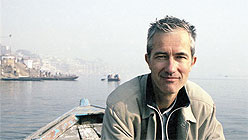Last spring, as a matter of friendly procedure, KQED Arts asked the British writer Geoff Dyer which movie he would choose to live inside. In retrospect it seems obvious that Andrei Tarkovsky’s Stalker was Dyer’s answer.
Stalker is a long, slow, metaphysical Russian film from 1979. (“Andrei Tarkovsky” in Russian means “long, slow, metaphysical.”) It involves three men on a trip to a forbidden place, each for private personal reasons. Stalker is the name of the character who leads expeditions to this place, where deep desires are said to get fulfilled.
Today, what’s so special about the film, aside from it being a great cine-poet’s mesmerizing road movie of the Soviet twilight, is the fact that Dyer has written a book about it. Dyer is one of those rare geniuses who writes well about everything because he always winds up writing about himself. The navel into which he gazes is the world’s as well as his own. Thus is he very possibly the only living English-speaking person who can hold forth at length on Tarkovsky without boring the hell out of you.
Zona, the newest of Dyer’s nimble nonfiction category-busters, describes itself as “A Book About a Film About a Journey to a Room.” It is that, and also an essay about wish fulfillment, the management of time, and the variable likelihood of perception-expanding cinema, among other art forms, to exist in our lives. In short, it is Dyer’s characteristically digressive memoir of what Tarkovsky’s movie has meant to him, which is a lot.

Stalker, Andrei Tarkovsky, 1980.
Historically, Stalker was a beleaguered beast, heavily rewritten, reshot, and, fatefully, relocated to just downriver of a chemical plant whose toxicity may later have caused the filmmaker’s fatal cancer. Tarkovsky also had a heart attack during postproduction, and was prone, as Dyer gently puts it, to “megalomaniacal uncertainties.”



